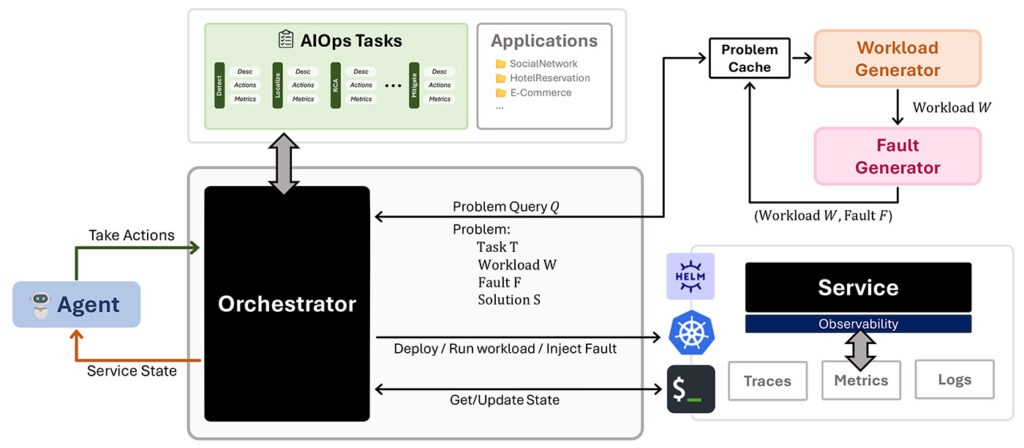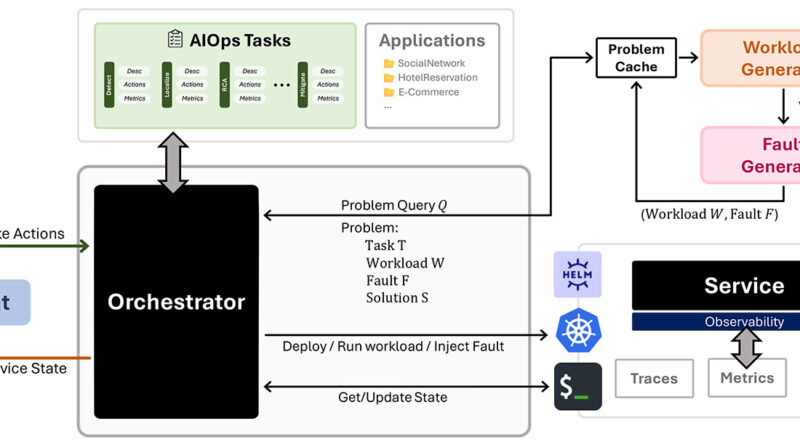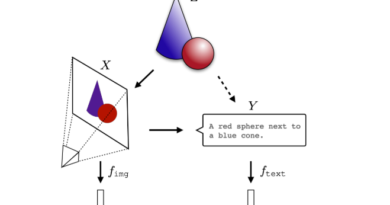Microsoft Research Unveils AIOpsLab: The Open-Source Framework Revolutionizing Autonomous Cloud Operations
As cloud computing ecosystems grow increasingly complex, the demand for reliable and efficient IT operations has become more critical than ever. Organizations rely on intricate cloud infrastructures to power their digital services, often requiring site reliability engineers (SREs) and DevOps teams to manage fault detection, diagnosis, and resolution under intense pressure. While automation tools and AIOps (Artificial Intelligence for IT Operations) agents have made significant strides in recent years, they frequently lack standardization, reproducibility, and the ability to simulate real-world conditions effectively.
To bridge these gaps, Microsoft Research, in collaboration with academic institutions such as the University of California, Berkeley, and the University of Illinois Urbana-Champaign, has unveiled AIOpsLab, an open-source framework specifically designed to enable the systematic evaluation and development of AIOps agents. By providing a unified platform for testing and improving these agents under production-like conditions, AIOpsLab is set to become a cornerstone in advancing autonomous cloud operations.
The Challenges of Modern IT Operations
1. Complexity of Cloud Systems
Modern cloud infrastructures leverage microservices, serverless architectures, and Kubernetes environments to deliver scalable and efficient services. However, this increased modularity introduces numerous potential failure points, ranging from misconfigured microservices to network latency issues.
2. Limitations of Current AIOps Tools
Despite advancements in AIOps technologies, existing tools face significant challenges:
- Lack of Standardization: Evaluation frameworks vary widely, making it difficult to compare AIOps agents effectively.
- Reproducibility Issues: Real-world scenarios are challenging to replicate consistently.
- Inadequate Fault Simulation: Many tools fail to emulate complex failure scenarios accurately, limiting their ability to test agents under realistic conditions.
These limitations result in AIOps agents that may perform well under controlled settings but struggle when deployed in dynamic, real-world environments.
What is AIOpsLab?
AIOpsLab is a comprehensive framework that aims to address the shortcomings of traditional AIOps tools by providing a robust, reproducible, and modular testing environment. Its open-source nature fosters collaboration and innovation among researchers and practitioners, enabling the development of next-generation AIOps agents capable of autonomously managing cloud operations.
Key Features and Components
1. Orchestrator
The orchestrator serves as the central module, mediating interactions between AIOps agents and cloud environments. It provides:
- Task Descriptions: Detailed problem statements to guide the agents.
- Action APIs: Interfaces for executing actions within the cloud environment.
- Feedback Mechanisms: Real-time performance metrics to inform decision-making.
2. Fault and Workload Generators
These components replicate real-world conditions by:
- Injecting faults such as misconfigured microservices or resource bottlenecks.
- Generating workloads that mimic diverse user interactions and traffic patterns.
3. Observability Tools
AIOpsLab incorporates comprehensive observability features, including:
- Telemetry Data: Logs, metrics, and traces for diagnosing faults.
- Visualization Dashboards: Tools for monitoring system performance and agent actions in real time.
4. Compatibility
The framework integrates seamlessly with modern cloud architectures such as Kubernetes and microservices, ensuring its applicability across diverse operational environments.

Technical Highlights and Benefits
1. Modular and Flexible Design
AIOpsLab’s modular architecture allows researchers to customize and extend the framework to suit specific use cases. This flexibility ensures its relevance across various industries and cloud environments.
2. Reproducible Benchmarks
By standardizing the evaluation of AIOps agents, AIOpsLab ensures consistent and comparable results, enabling researchers to measure progress accurately.
3. Enhanced Fault Diagnosis and Resolution
The integration of detailed telemetry data with fault injection capabilities allows agents to develop advanced fault localization and resolution strategies, reducing system downtime and improving reliability.
4. Scalability
AIOpsLab supports large-scale simulations, making it ideal for testing agents in high-demand scenarios, such as Black Friday sales or major software rollouts.
Real-World Use Case: SocialNetwork Application
To demonstrate its capabilities, AIOpsLab was tested using the SocialNetwork application from the DeathStarBench suite. A misconfigured microservice fault was introduced, and a large language model (LLM)-based AIOps agent employing the ReAct framework powered by GPT-4 was tasked with diagnosing and resolving the issue.
Results
- Fault Resolution Time: The agent successfully identified and resolved the issue within 36 seconds.
- Effectiveness of Telemetry Data: Detailed logs and metrics enabled precise root cause analysis.
- Balanced Actions: The orchestrator’s API design allowed the agent to adopt a balanced approach between exploratory and targeted actions, optimizing resolution time.
These results underscore AIOpsLab’s effectiveness in simulating real-world conditions and benchmarking AIOps agents.
How AIOpsLab Compares to Existing Tools
| Feature | AIOpsLab | Traditional Tools |
|---|---|---|
| Fault Injection | Comprehensive and realistic | Limited to basic faults |
| Reproducibility | Standardized and repeatable benchmarks | Inconsistent |
| Telemetry Support | Full logs, metrics, and traces | Basic logging |
| Modularity | Highly customizable | Fixed configurations |
| Scalability | Suitable for large-scale environments | Limited capacity |
Applications of AIOpsLab
1. Advancing Autonomous Cloud Operations
AIOpsLab enables researchers to develop agents that can autonomously manage fault detection, diagnosis, and resolution, reducing reliance on manual interventions.
2. Improving DevOps Workflows
By integrating realistic fault simulations, DevOps teams can stress-test their workflows and identify vulnerabilities before deployment.
3. Regulatory Compliance and Security
The framework provides tools for monitoring and maintaining compliance with industry regulations, ensuring secure and reliable cloud operations.
4. Academic and Industrial Research
AIOpsLab’s open-source nature makes it an invaluable resource for academic researchers and industry professionals exploring the next frontier in IT operations.
Future Directions
Microsoft Research aims to expand AIOpsLab by incorporating:
- Advanced Machine Learning Algorithms: To improve fault prediction and resolution capabilities.
- Multi-Cloud Support: Enabling compatibility with diverse cloud providers.
- Enhanced User Interfaces: To simplify framework adoption for non-technical users.
These developments will further solidify AIOpsLab’s position as the go-to framework for advancing autonomous cloud operations.
Conclusion
AIOpsLab represents a transformative step in the evolution of IT operations. Addressing existing tools’ gaps and providing a comprehensive, reproducible, and realistic evaluation framework empowers researchers and practitioners to develop more reliable and efficient AIOps agents.
With its open-source nature, modular design, and support for real-world fault simulations, AIOpsLab is poised to play a pivotal role in shaping the future of autonomous cloud operations. As cloud systems continue to grow in scale and complexity, frameworks like AIOpsLab will be essential for ensuring operational reliability and unlocking the full potential of AI-driven IT solutions.
Check out the Paper, GitHub and Microsft Details. All credit for this research goes to the researchers of this project.
Do you have an incredible AI tool or app? Let’s make it shine! Contact us now to get featured and reach a wider audience.
Explore 3800+ latest AI tools at AI Toolhouse 🚀. Don’t forget to follow us on LinkedIn. Do join our active AI community on Discord.
Read our other blogs on LLMs 😁
If you like our work, you will love our Newsletter 📰






